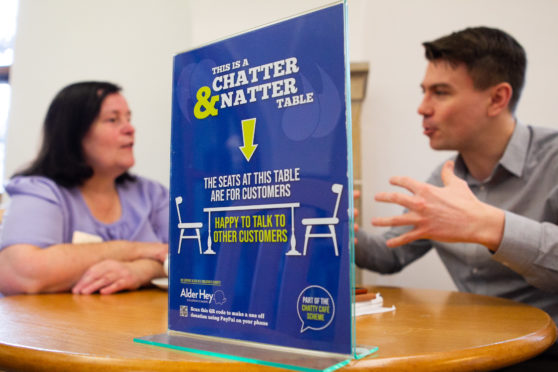
It is not only TV sofa king Alan Partridge who knows the power of chat.
When nearly half of the UK’s older people – almost six million people – say their main form of company in life is the television set, social isolation is an increasingly pressing issue.
Among all age groups, around 10% of Scots of say they feel lonely often, and a fifth have little contact with their neighbours.
Now an innovative idea for cafes is hoping to help the chat flow free.
Glasgow City Council has announced it will be introducing Chatter and Natter Tables to its café at the St Mungo’s Museum of Religious Life and Art, run by Encore Hospitality Services.
The scheme is being rolled out to their other cafes in Bellahouston Leisure Centre, Tollcross International Swimming Centre, Kelvin Hall and Tramway in Glasgow.
Certain tables are marked with distinctive signs indicating that customers who sit there are happy to talk to others.
It’s hoped the tables encourage people to make conversation with a stranger, and give an opportunity to those who feel lonely to connect with someone else.
Although it began in England, the idea has been brought to St Mungo’s café by Alicia Watson, Learning And Access Curator at Glasgow City Council.
“The idea is to have a normal table with a little poster explaining that if you want to chat to someone, you can sit there,” she explained.
“It’s up to the café how often they operate the table. Some have it open all the time, others might only open it up on a Wednesday afternoon.”
New mum Alex Hoskyn, from Oldham, created the project in 2016.
She was feeling isolated while with her infant son at a café, but regretted not having spoken to another customer who looked similarly lonely.
She began the Chatty Café scheme and since 2017 it has been introduced in 500 cafes in England, and larger companies like Costa and Tesco have signed up.
One person who uses the tables now is St Mungo’s café manager Ann Cameron – but she was sceptical at first.
“I wasn’t sure to begin with, we were a bit suspicious of what the table was for, and who would use them,” she explained.
“But now I think they’re an essential part of the café. They’ve brought a slightly different air of friendliness I wasn’t expecting.
“Some days the tables are quiet but on others they are full with all different types of people. Like single mums, pensioners, autistic people visiting with carers.
“It’s nice to sit and have a cup of tea with people you perhaps wouldn’t have spoken to, there’s something about having that human interaction which we all need.
“I’ll try to sit with people if they come in, and some stick with you. One woman was telling me about her partner, and she was in floods of tears.
“It’s just nice to be there for someone else for a little while. If anyone else has a café they should give Chatter and Natter Tables a go.”
The effects of loneliness are serious and tangible. It is associated with an increase in the risk of developing health problems, including depression, strokes, heart attacks, Alzheimer’s and dementia.
Being socially isolated is estimated to be as harmful as smoking 15 cigarettes per day.
But the tables themselves won’t end the epidemic of isolation, according to Alicia.
“They’re not about building a friendship,” she explained. “It’s just about having a conversation. And that can have a massive effect on someone’s day. Recently someone asked if they could sit at a table when I was in a café, and I was only too happy to have a chat.
“By having these posters inviting people to sit down it hopefully takes the awkwardness away. You’re not forcing yourself on someone, it’s like you’re being invited.
“I think we are lonelier than we used to be as a society, but the nice thing is we’re talking about it more than we used to.
“It’s being talked about by Governments as a public health issue, not just something people are ashamed of themselves.”

Enjoy the convenience of having The Sunday Post delivered as a digital ePaper straight to your smartphone, tablet or computer.
Subscribe for only £5.49 a month and enjoy all the benefits of the printed paper as a digital replica.
Subscribe